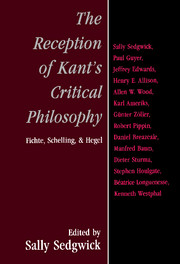Book contents
- Frontmatter
- Contents
- Notes on the Contributors
- Acknowledgments
- Introduction: Idealism from Kant to Hegel
- 1 The Unity of Nature and Freedom: Kant's Conception of the System of Philosophy
- 2 Spinozism, Freedom, and Transcendental Dynamics in Kant's Final System of Transcendental Idealism
- 3 Is the Critique of Judgment “Post-Critical”?
- 4 The “I” as Principle of Practical Philosophy
- 5 The Practical Foundation of Philosophy in Kant, Fichte, and After
- 6 From Critique to Metacritique: Fichte's Transformation of Kant's Transcendental Idealism
- 7 Fichte's Alleged Subjective, Psychological, One-Sided Idealism
- 8 The Spirit of the Wissenschaftslehre
- 9 The Beginnings of Schelling's Philosophy of Nature
- 10 The Nature of Subjectivity: The Critical and Systematic Function of Schelling's Philosophy of Nature
- 11 Substance, Causality, and the Question of Method in Hegel's Science of Logic
- 12 Point of View of Man or Knowledge of God: Kant and Hegel on Concept, Judgment, and Reason
- 13 Kant, Hegel, and the Fate of “the” Intuitive Intellect
- 14 Metaphysics and Morality in Kant and Hegel
- Bibliography
- Index
11 - Substance, Causality, and the Question of Method in Hegel's Science of Logic
Published online by Cambridge University Press: 03 December 2009
- Frontmatter
- Contents
- Notes on the Contributors
- Acknowledgments
- Introduction: Idealism from Kant to Hegel
- 1 The Unity of Nature and Freedom: Kant's Conception of the System of Philosophy
- 2 Spinozism, Freedom, and Transcendental Dynamics in Kant's Final System of Transcendental Idealism
- 3 Is the Critique of Judgment “Post-Critical”?
- 4 The “I” as Principle of Practical Philosophy
- 5 The Practical Foundation of Philosophy in Kant, Fichte, and After
- 6 From Critique to Metacritique: Fichte's Transformation of Kant's Transcendental Idealism
- 7 Fichte's Alleged Subjective, Psychological, One-Sided Idealism
- 8 The Spirit of the Wissenschaftslehre
- 9 The Beginnings of Schelling's Philosophy of Nature
- 10 The Nature of Subjectivity: The Critical and Systematic Function of Schelling's Philosophy of Nature
- 11 Substance, Causality, and the Question of Method in Hegel's Science of Logic
- 12 Point of View of Man or Knowledge of God: Kant and Hegel on Concept, Judgment, and Reason
- 13 Kant, Hegel, and the Fate of “the” Intuitive Intellect
- 14 Metaphysics and Morality in Kant and Hegel
- Bibliography
- Index
Summary
In the eyes of many, Hegel's Science of Logic appears to be a monstrous anachronism – a work, written thirty years after Kant's Critique of Pure Reason, that revives precisely the kind of naive metaphysics Kant had shown to be illegitimate. For Hegel, by contrast, the Logic represents the culmination of a philosophical development that Kant himself set in motion. Kant's great achievement, in Hegel's view, was to place at the center of philosophical attention the categories through which philosophers had traditionally understood the world. Philosophers from Aristotle to Spinoza and Leibniz employed various categories, such as “substance” and “causality,” to understand what there is, but, according to Hegel, they never examined with sufficient rigor whether it is actually legitimate to employ them in the way they did. Kant's merit is to have focused specifically on those categories themselves and to have undertaken an extensive and thorough enquiry into their source and range of validity.
In the course of his enquiry, Kant recognized that the source of the categories was not empirical experience or divine revelation but the spontaneity of thought itself and that the true character of the categories could thus be discovered by examining the distinctive activity of thought. This Kantian insight above all others is the one that Hegel embraces most keenly in his Logic. From Hegel's perspective, however, Kant's own attempt to discover the categories in the Metaphysical Deduction in the Critique of Pure Reason falls short of what a truly critical philosophy should deliver: Kant simply took it for granted that the basic activity of thought is that of using concepts in judgments and read off the categories from what he saw as the primary logical functions of judgment
- Type
- Chapter
- Information
- The Reception of Kant's Critical PhilosophyFichte, Schelling, and Hegel, pp. 232 - 252Publisher: Cambridge University PressPrint publication year: 2000
- 4
- Cited by



